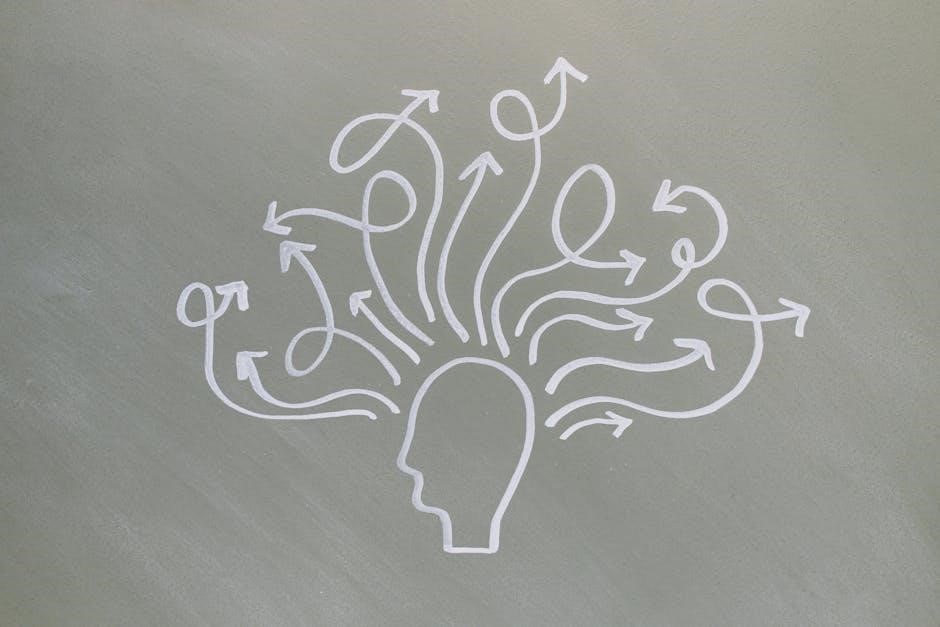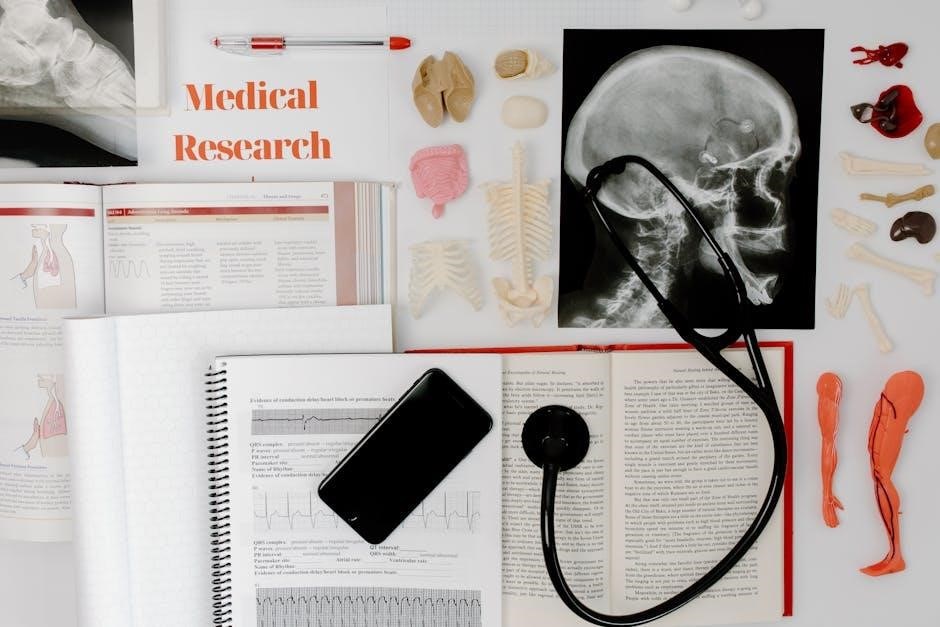AP Psychology PDF textbooks provide comprehensive coverage of psychological concepts, theories, and research, offering students a flexible and accessible way to master course material.
1.1 Overview of AP Psychology as a Course
AP Psychology is a rigorous, college-level course that explores the scientific study of behavior and mental processes. It covers topics such as research methods, cognitive processes, and abnormal psychology, preparing students for the AP exam. The curriculum emphasizes critical thinking, analysis, and application of psychological principles to real-world scenarios. Students learn to evaluate theories, conduct experiments, and understand the ethical implications of psychological research. This foundational course is designed to foster a deep understanding of human behavior and mental processes, equipping students with skills for further academic and professional pursuits.
1.2 Importance of Textbooks in AP Psychology
Textbooks are a cornerstone for AP Psychology, offering structured and comprehensive content aligned with course objectives. They provide in-depth explanations of key theories, concepts, and research, ensuring students grasp foundational knowledge. Textbooks also include practice questions and case studies, enhancing exam preparation and critical thinking. Their organized format helps students navigate complex topics efficiently, making them an essential resource for academic success and mastery of psychological principles.
1.3 Benefits of Using PDF Textbooks
AP Psychology PDF textbooks offer unparalleled convenience and accessibility, allowing students to study anywhere, anytime. They are cost-effective, reducing the financial burden of traditional textbooks. PDFs enable easy searching, highlighting, and note-taking, enhancing studying efficiency. Additionally, they provide instant access to updated content, ensuring students stay current with the latest research and theories. Their digital format also supports environmental sustainability, making them a practical choice for modern learners seeking flexibility and efficiency in their academic preparation.

Structure and Content of AP Psychology Textbooks
AP Psychology textbooks are structured to cover essential chapters, key concepts, theories, case studies, and real-world applications, providing a comprehensive understanding of psychological principles and practices.
2.1 Typical Chapters and Topics Covered
AP Psychology textbooks typically cover chapters on research methods, biological bases of behavior, sensation and perception, learning, memory, motivation, emotions, developmental psychology, personality, psychological disorders, and social psychology. These topics provide a foundational understanding of psychological principles and practices, preparing students for in-depth analysis and application in various contexts.
2.2 Key Concepts and Theories in AP Psychology
AP Psychology textbooks delve into foundational theories like classical conditioning, operant conditioning, and cognitive psychology. Key concepts include memory models, motivation theories (e.g., Maslow’s hierarchy), emotional processes, and developmental stages. Students explore psychological disorders, such as anxiety and depression, and social psychology topics like conformity and groupthink. These theories, rooted in the work of psychologists like Freud, Skinner, and Erikson, provide a framework for understanding human behavior and mental processes, essential for exam preparation and real-world application.
2.3 Case Studies and Real-World Applications
AP Psychology textbooks often include case studies that illustrate key concepts, such as Phineas Gage’s brain injury or the Stanford Prison Experiment. These examples help students connect theoretical ideas to real-life scenarios, enhancing understanding. Textbooks also highlight applications of psychological principles in fields like education, healthcare, and criminal justice. By exploring how psychology impacts everyday life, students gain practical insights and develop critical thinking skills, preparing them for both academic exams and real-world challenges.

Recommended AP Psychology Textbooks
Popular choices include “Myers Psychology for the AP Course” and the “AP Psychology Prep Book,” both offering comprehensive coverage and practice materials for exam success.
3.1 “Myers Psychology for the AP Course” by David G. Myers
Written by renowned psychologist David G. Myers, this textbook is a cornerstone for AP Psychology students. It offers a detailed exploration of psychological concepts, theories, and research, aligning closely with the AP curriculum. The text is known for its engaging writing style, which makes complex topics accessible. It includes practical examples, case studies, and review questions to aid comprehension. Students praise the book for its clarity and effectiveness in preparing for exams. Myers’ expertise ensures a scientifically rigorous yet approachable learning experience.
3.2 “AP Psychology Prep Book” by Various Authors
The “AP Psychology Prep Book” is a valuable resource designed to help students excel on the AP exam. This comprehensive guide, authored by various experts, covers key concepts, theories, and research studies. It includes practice tests, review materials, and strategies for mastering the exam. The book is known for its clear explanations and focus on high-yield topics. With 701 pages, it provides detailed coverage of the curriculum, making it an essential tool for targeted study and exam preparation. Its structured approach ensures students are well-prepared for the challenges of the AP Psychology exam.
3.3 “Psychology for the AP Course” by C. Nathan DeWall
“Psychology for the AP Course” by C. Nathan DeWall is a widely-used textbook that aligns closely with the AP Psychology curriculum. Co-authored with David G. Myers, this book offers a comprehensive overview of psychological principles, theories, and research. It is known for its structured format, which helps students organize their study materials effectively. The textbook includes case studies and real-world applications, making complex concepts more relatable. Its clear explanations and focus on key topics make it an excellent resource for students preparing for the AP exam.

Digital Resources and Study Guides
Digital resources and study guides, including online platforms and interactive PDFs, offer engaging tools for AP Psychology students to enhance learning and exam preparation effectively.
4.1 Online Study Guides for AP Psychology
Online study guides for AP Psychology are valuable resources that complement PDF textbooks. Platforms like AP Central offer detailed unit overviews, practice questions, and video tutorials. These guides often include chapter summaries, key terms, and concept reviews, helping students grasp complex topics. Many guides feature interactive elements such as flashcards and quizzes, which enhance retention. Additionally, they provide access to supplementary materials like printable worksheets and progress-tracking tools. These resources are especially useful for self-study and exam preparation, ensuring students are well-equipped to master the course material effectively.
4.2 Interactive PDF Features for Learning
Interactive PDF features in AP Psychology textbooks enhance learning through clickable links, embedded videos, and quizzes. These tools allow students to engage with content dynamically, fostering deeper understanding. Hyperlinked glossaries and concept maps provide quick access to definitions and relationships between ideas. Embedded multimedia, such as lectures or simulations, enriches textbook material. Quizzes and fillable forms enable self-assessment and practice. These features cater to diverse learning styles, making study sessions more efficient and enjoyable while ensuring mastery of complex psychological concepts. Interactive PDFs are a valuable asset for modern learners.
4.3 Supplementary Materials for Exam Preparation
Supplementary materials for AP Psychology exam preparation include practice tests, study guides, and flashcards. These resources complement PDF textbooks by providing additional practice opportunities. Many textbooks offer online companions with interactive quizzes and review sheets. Practice tests simulate exam conditions, helping students assess their knowledge and identify weak areas. Flashcards reinforce key terms and concepts, while study guides offer detailed explanations of complex topics. These materials are essential for targeted review, enabling students to refine their understanding and improve test-taking strategies. They are invaluable tools for achieving success on the AP Psychology exam.

Controversies and Debates in AP Psychology Textbooks
Controversies arise over textbook content, such as LGBTQ+ inclusion and cultural sensitivity. Debates often reflect societal values versus scientific rigor, impacting curriculum approval processes nationwide.
5.1 Content Debates in Williamson County Schools
In Williamson County Schools, debates arose over the inclusion of LGBTQ+ content in AP Psychology textbooks. Concerns were raised by some community members, prompting the school board to review the material. After significant public input and discussions, the board ultimately approved the textbook, acknowledging its alignment with academic standards. This controversy highlights the challenges of balancing diverse community values with the need for comprehensive, scientifically accurate educational resources. Such debates underscore the importance of textbooks as tools for fostering inclusive and informed discussions in psychology education.
5.2 Inclusion of LGBTQ+ Content in Textbooks
The inclusion of LGBTQ+ content in AP Psychology textbooks has become a focal point of discussion. Modern textbooks increasingly address LGBTQ+ topics to reflect diverse experiences and promote inclusivity. This shift aims to provide students with a broader understanding of psychological concepts, including identity formation and mental health within LGBTQ+ communities. However, this expansion has also sparked debates, with some arguing for its relevance and others expressing concerns about cultural sensitivities. Publishers are working to integrate such content thoughtfully, ensuring it aligns with scientific research and educational standards while respecting varied perspectives.
5.3 Balancing Scientific Rigor with Sensitivity
Balancing scientific rigor with sensitivity is crucial in AP Psychology textbooks. Publishers strive to present research accurately while addressing cultural and social sensitivities. Controversies often arise when topics like LGBTQ+ issues or diversity are covered, requiring careful handling to avoid bias; Textbooks must reflect diverse perspectives without compromising scientific integrity. This balance ensures content is both informative and respectful, fostering an inclusive learning environment. Regular updates to textbooks help incorporate evolving research and societal changes, maintaining relevance and sensitivity in psychological discussions.

Exam Preparation and Review
Effective exam preparation involves mastering key concepts, practicing with past papers, and utilizing digital resources like interactive PDFs for targeted review and concept clarification.
6.1 Strategies for Mastering AP Psychology
Mastering AP Psychology requires a structured approach: active reading of PDF textbooks, self-quizzing on key terms, creating concept maps, using flashcards for retention, and solving practice tests. Regular review of notes and summarizing chapters in your own words enhances understanding. Engaging with online forums and study groups provides additional insights. Prioritizing difficult topics and seeking clarification early ensures a strong foundation. Consistent practice, spaced repetition, and applying concepts to real-world scenarios are essential for long-term retention and exam success. Staying organized and maintaining a study schedule is crucial.
6.2 Practice Tests and Review Materials
Practice tests and review materials are essential for AP Psychology preparation. Utilizing PDF textbooks with included practice questions or separate review guides helps familiarize students with exam formats. Online resources, such as quizzes and flashcards, reinforce key concepts and terms. Regularly reviewing summaries, concept maps, and past exams improves retention and identifies areas for focus. Many textbooks also offer supplementary materials like study guides and interactive activities to enhance understanding and readiness for the exam. Consistent review ensures students are well-prepared for the challenges of the AP Psychology exam.
6.3 Tips for Success on the AP Exam
Success on the AP Psychology exam requires strategic preparation and effective study habits. Start by understanding the exam format and content, focusing on key concepts and theories. Use active learning techniques like summarizing notes and self-quizzing to reinforce knowledge. Allocate time for practice tests to improve time management and reduce anxiety. Review mistakes to identify weak areas. Stay organized, prioritize challenging topics, and seek clarification on confusing material. Utilize online resources and study guides for additional support. Consistent effort and a well-planned study schedule are crucial for achieving a high score.

The Role of Textbooks in Teaching AP Psychology
Textbooks serve as foundational tools, organizing complex psychological concepts into structured, accessible content, aiding both instructors and students in achieving learning objectives effectively.
7.1 Textbooks as a Primary Learning Resource
Textbooks are the cornerstone of AP Psychology education, offering a structured and comprehensive overview of psychological principles, theories, and research. They provide students with a centralized source of information, ensuring consistency and depth in learning. Key concepts, such as cognitive processes and behavioral theories, are presented in an organized manner, making complex topics accessible. With the rise of digital formats, PDF textbooks enhance accessibility, allowing students to study anytime, anywhere. They remain indispensable for mastering the curriculum and preparing for exams, serving as a primary tool for academic success in AP Psychology.
7.2 Integration with Other Teaching Materials
AP Psychology PDF textbooks are often integrated with online study guides, interactive quizzes, and multimedia resources to enhance learning. They complement classroom lectures and laboratory activities, providing a cohesive educational experience. Interactive PDF features, such as embedded videos and clickable links, connect students to additional resources. Supplementary materials like practice tests and concept summaries further reinforce textbook content. This integration ensures a well-rounded understanding of psychological concepts, making textbooks a versatile tool in combination with other teaching methods for AP Psychology students.

7.3 Impact on Student Performance

AP Psychology PDF textbooks significantly enhance student performance by providing accessible, organized, and engaging content. The ability to highlight, annotate, and search within digital texts improves study efficiency. Interactive features, such as embedded quizzes and videos, cater to diverse learning styles, boosting comprehension; Regular access to supplementary materials ensures consistent preparation for exams. Overall, these resources empower students to achieve higher academic success and confidence in mastering complex psychological concepts.

Emerging Trends in AP Psychology Textbooks
Digital tools, interactive simulations, and AI-driven personalization are transforming AP Psychology textbooks, enhancing engagement and tailored learning experiences for students.
8.1 Digital and Interactive Learning Tools
Digital and interactive learning tools are revolutionizing AP Psychology textbooks, offering engaging simulations, virtual labs, and real-time feedback. These tools enable students to explore complex psychological concepts through hands-on activities, fostering deeper understanding. AI-driven personalization adapts content to individual learning needs, while multimedia elements like videos and quizzes enhance retention. Interactive PDFs with clickable diagrams and flashcards provide a dynamic learning experience, making traditional textbooks more accessible and effective for modern students.
8.2 Increased Focus on Diversity and Inclusion
Modern AP Psychology textbooks emphasize diversity and inclusion, reflecting the field’s growing commitment to representation. Content now highlights contributions from psychologists of diverse backgrounds, addressing race, gender, and cultural influences. LGBTQ+ topics are integrated to ensure comprehensive coverage. This shift fosters empathy and prepares students to understand psychology’s global relevance, promoting equitable learning experiences that resonate with all learners.
8.3 Updating Content to Reflect Current Research
AP Psychology textbooks now incorporate the latest research findings, ensuring students engage with cutting-edge knowledge. Updates include advancements in neuroscience, cognitive psychology, and behavioral studies. Digital editions allow real-time revisions, keeping content aligned with scientific progress. This dynamic approach enables learners to grasp evolving theories and methodologies, preparing them for a field that continuously expands our understanding of human behavior and mental processes. Stay informed with the most recent discoveries shaping modern psychology.
AP Psychology PDF textbooks are vital for student success, balancing scientific rigor with sensitivity. Their evolution reflects modern teaching, ensuring accessibility and inclusivity for all learners.
9.1 Final Thoughts on the Importance of Textbooks
Textbooks are foundational tools for AP Psychology, offering structured learning and in-depth coverage of key concepts. They provide students with a comprehensive understanding of psychological principles, theories, and research, ensuring a solid academic foundation. By integrating real-world applications and diverse perspectives, textbooks not only enhance learning but also prepare students for the challenges of the AP exam and future academic pursuits in psychology.
9.2 Encouragement for Students to Utilize Resources
Students are encouraged to fully utilize AP Psychology PDF textbooks and supplementary materials to deepen their understanding of key concepts and theories. These resources are designed to provide a comprehensive and engaging learning experience, helping students prepare for the AP exam and beyond. By leveraging interactive features, real-world applications, and study guides, students can enhance their critical thinking and retention of material. Consistent use of these tools will not only improve academic performance but also foster a lifelong appreciation for the field of psychology.
